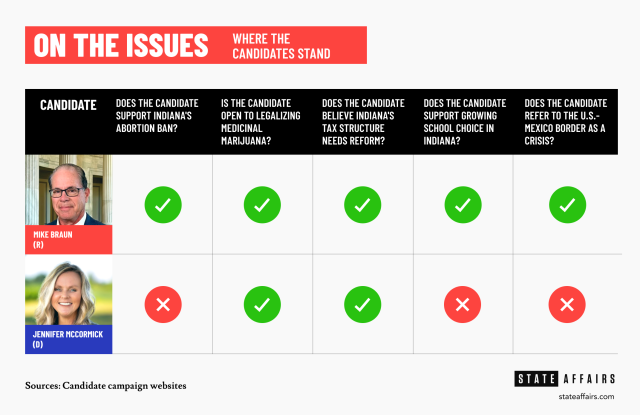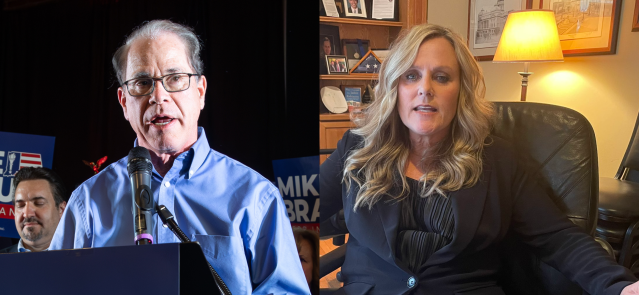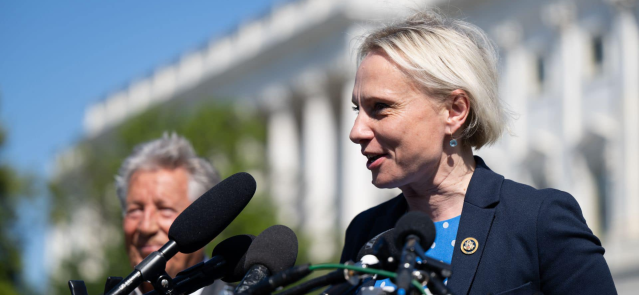Stay ahead of the curve as a political insider with deep policy analysis, daily briefings and policy-shaping tools.
Request a DemoLawmakers want to loosen child labor laws. Here’s what the bill would do.

The Indiana Statehouse January 9, 2024. (Credit: Ronni Moore)
Gist
Lawmakers want to loosen Indiana’s child labor laws, eliminating restrictions on how late 16-year-olds can work on school nights.
Bill author Rep. Kendell Culp, R-Rensselaer, said House Bill 1093 will align Indiana’s youth labor laws to more closely match those on a federal level.
“1093 is a teenage workforce bill,” Culp said. “This bill allows parents the flexibility to better accommodate the learning their youth receives beyond the classroom setting.”
Opponents, though, fear that loosening standards could enable employers to take advantage of young people, impacting their education.
House Bill 1093 has already passed the House by a 66-31 vote and was voted out of the Senate Committee on Pensions and Labor this week, almost entirely along party lines. Only a couple of Republicans joined Democrats in rejecting the bill on the House floor.
What the bill does
Under House Bill 1093, 16- and 17-year-olds would no longer have any restrictions on when and how many hours per week they can work. Under current Indiana law, 16 and 17-year-olds can only work until 10 p.m. on a school night unless they get permission from a parent, and can’t work more than 40 hours in a school week.
The bill also exempts 14 and 15 year olds from Indiana’s child labor laws if they’ve graduated from high school or completed eighth grade and are excused from compulsory school attendance requirements. That often applies to those who are Amish, who often don’t attend school after eighth grade..
Supporters argued that other students can get home late due to away sporting events, and that those working should be afforded the same opportunities.
“How can the kids in sports play in games until 9, 10 o’clock at night but they can’t work past 7 o'clock on a school night?” asked Todd Gudeman, who runs a fast food restaurant. “People in sports, they aren’t getting their homework done.”
The legislation also provides a new exception to child labor laws for child actors and newspaper carriers. Plus, the bill would also allow 16 and 17 year olds to work in hazardous jobs if they are working in the agriculture sector.
Why it matters
Some opponents worry that loosening child labor laws could harm young people, particularly those living in poverty.
Lauren Murfree, policy analyst with Indiana Community Action Poverty Institute, told a story during a committee hearing on Wednesday about her own experience getting injured while working at a restaurant at 16 years old.
Before the injury, she had to contribute to her household in order to keep them afloat. She said her employer forced her to clock out before cleaning at night, but if she spoke up she was worried she would be fired.
“We need to recognize that particularly for youth in poverty, adults retain the most power and in turn can cause the most harm,” Murfree said. “We’re stealing from the futures of our youth for the profits of these businesses when we loosen protections on youth employment.”
Sen. Rodney Pol, D-Chesterton, echoed those same concerns.
“The idea that you have children that do have to work to support their families, that now may be subject to losing their position if they don’t work enough that I think is problematic,” Pol said. “‘We need you to work more, now we legally can require you to do so.’”
There were more than 19,000 youth employment violations of various types in 2023 according to the Indiana Department of Labor.
Employers who rely on teenage labor want to see this legislation enacted, arguing it would provide more opportunities for valuable on-the-job educational opportunities for young people.
Plus, they say they need the employees.
Jennifer Ousley, who represents Indiana Beach Amusement Park, said the park has increasingly had to rely on bringing people in from out of the country for the summer in order to make up for a lack of workers.
She said her own first job at 13 years old helped her develop a great work ethic.
“At 13 I sought after my first job because I wanted a sense of belonging, I wanted to have a sense of leadership,” Ousley said. “Working at such an early age was part of my mental health.”
Likewise, Jay Chupp, whose family is Amish, spoke in favor of the bill because he wants his children, who stop attending school after eighth grade, to have more opportunities to work.
“As an Amish parent of teenagers,” Chupp said, “I strongly believe now is the time my kids need to be learning the soft skills that will be so beneficial now and in their future.”
What’s next?
Because the bill could reduce the amount of fines employers receive for violating child labor laws, the legislation will have to pass out of the powerful Senate Appropriations committee, too.
Next week is the deadline for a bill to make it out of committee.
Contact Kaitlin Lange on X @kaitlin_lange or email her at [email protected].
Facebook @stateaffairsin
Instagram @stateaffairsin
LinkedIn @stateaffairs
Read this story for free.
Create AccountRead this story for free
By submitting your information, you agree to the Terms of Service and acknowledge our Privacy Policy.
How McCormick, Braun view abortion, taxes and other key issues
A Democrat-turned-Republican and Republican-turned-Democrat will soon face off in the race to become Indiana’s next governor.
Sen. Mike Braun, who voted as a Democrat prior to 2012, captured the Republican nomination in Tuesday’s primary. Jennifer McCormick, formerly a Republican Superintendent of Public Instruction, will represent the Democrats.
Voters will decide the state’s next chief executive in November.
A State Affairs analysis of the candidates’ campaign platforms and public statements found key differences — and a few similarities — in their planned approaches to a variety of issues impacting Hoosier voters.
Here is how they match up.
Abortion
Braun: As a senator, Braun has long supported abortion restrictions.
In 2020, he called for the Supreme Court to re-examine Roe v. Wade.
In 2023, he proposed federal legislation that would have required parental notification before any unemancipated minor could seek an abortion. He said at the time: “Hoosiers put their trust in me to stand up for the unborn, and that’s what I’ve been proud to do every day in the Senate.”
He has since signaled support for the state’s abortion ban. His platform reads: “State lawmakers must work to ensure the gains we have made to protect life are secured and strengthened.”
McCormick: In a Tuesday interview with State Affairs, McCormick said her candidacy represented a referendum on reproductive rights.
“I’m going to fight to restore those rights under any authority I can, working in a bipartisan fashion, using our committees, board and our agencies. I also know, too, what everybody’s fear is: that they’re [Republicans] not going to restore those rights and will take [restrictions] further.”
From her platform: “Indiana’s Republican-led extreme abortion ban has taken away the right of women to make deeply personal decisions regarding their own health care.”
Marijuana
Braun: At a March 26 Republican primary debate, Braun suggested an openness to legalizing medicinal marijuana.
“It’s gonna hit all of us. I’m gonna listen to law enforcement — they have to put up with the brunt of it,” he said. “Medical marijuana is where I think the case is best made that maybe something needs to change. But I’ll take my cue from law enforcement there as well. … I hear a lot of input where [medical marijuana is] helpful, and I think that you need to listen and see what makes sense.”
McCormick: The Democrat’s platform also addresses medical marijuana legalization, while speculating on possible recreational use.
“We will fight for the legalization of medical marijuana as a source of state revenue established on a well-regulated marketplace and monitored by a Cannabis Task Force in order to study the issues, opportunities and potential obstructions associated with recreational marijuana legalization.”
McCormick said she would also support expunging low-level marijuana-related convictions.
Taxes
Braun: At a March 19 National Federation of Independent Business forum, Braun said the state’s property tax system “went out of whack because it couldn’t respond to inflation like we’ve never seen before.”
“The way you finance any lower taxes would be to bank on the government being run more efficiently,” he said.
His platform also calls for government spending cuts to finance lower taxes: “Reducing the size of government is the key to cutting taxes, and Mike Braun will work through every state agency to find ways to save money while delivering high-quality services to taxpayers.”
McCormick: McCormick also spoke about taxes at the March 19 forum.
“I agree with a revamp of our taxing system,” she said. “But also it’s about not just how we’re getting our revenue, it’s about our expenditures. Yes, we need to fix our gas tax. Yes, we need to look at the income tax. But here’s the thing: There are hidden taxes we’re not having a conversation about.”
Her platform also references the possibility of combining state agencies as a way to save money.
Education
Braun: In his platform, Braun supports broadening school choice and parental rights.
“As a former school board member, Mike Braun knows parents are the primary stakeholders in their children’s education and every family, regardless of income or zip code, should be able to enroll in a school of their choice and pursue a curriculum that prepares them for a career, college or the military,” the platform reads.
Braun also pledged to ensure critical race theory and discussions about gender are banned in public schools.
McCormick: Education is one of McCormick’s primary issues, according to her platform.
She calls for the elimination of statewide testing, increased early childhood reading and child care options and a minimum base salary of $60,000 for all K-12 teachers.
McCormick also addresses the state’s school choice movement.
“We will call for a pause in the expansion of school privatization efforts while requiring fiscal and academic accountability and transparency for all of Indiana schools that receive public tax dollars,” her platform reads.
U.S.-Mexico border
Braun: Braun’s television ads have touched on border security, and his platform calls for increased focus on the area.
“Joe Biden and the left have created a humanitarian and national security crisis on our southern border,” the platform reads. “As governor, Mike will continue to support and enact the America First policies that were working. Otherwise, every town will become a border town.”
McCormick: McCormick’s border-related plans are more focused on facilitating legal immigration.
“We will work with local, state and federal officials in supporting an immigrant system that creates a safe, timely, orderly and humane pathway for those seeking legal immigration while keeping our communities and those responsible for border security safe,” her platform reads.

Contact Rory Appleton on X at @roryehappleton or email him at [email protected].
Spartz, Shreve, Stutzman win Republican congressional primaries
A central Indiana congresswoman successfully fought off eight primary challengers, while crowded races for three other Republican-leaning congressional districts began to clear in Tuesday’s primary election. And in northeastern Indiana, a former congressman held on in a tight race as he seeks to return to Congress. All of the state’s nine U.S. House of Representatives …
Mike Braun wins the Indiana Republican nomination for governor
U.S. Sen. Mike Braun was declared the winner of the Republican gubernatorial nomination shortly after polls in Indiana’s Central Time Zone closed. With 98% of votes counted as of Wednesday morning, Braun had 39.6%, followed by Lt. Gov. Suzanne Crouch with 21.8%, Brad Chambers with 17.5%, Eric Doden with 11.9 %, Jamie Reitenour with 4.8% …
Here’s how to vote in Indiana’s primary election
Thousands of Hoosier voters will head to the polls Tuesday, May 7, for Indiana’s primary election. This year’s ballot includes a competitive contest for governor, as well as dozens of state and federal legislative races and a few school referenda. The primary will decide which candidates will represent their respective parties in the Nov. 5 …




